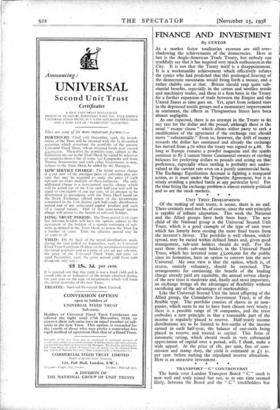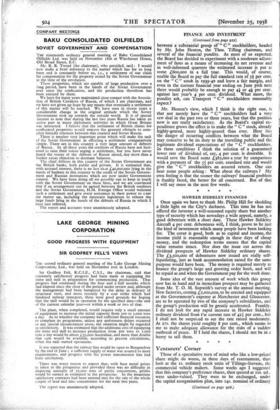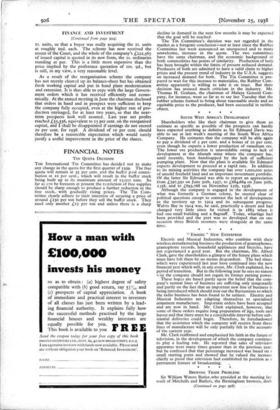FINANCE AND INVESTMENT
As a market factor totalitarian excesses are still over- shadowing the achievements of the democracies. Here at last is the Anglo-American Trade Treaty, but nobody can truthfully say that it has inspired very much enthusiasm in the City. It is not that the Treaty itself is a disappointment. It is a workmanlike achievement which effectively refutes the cynics who had predicted that this prolonged heaving of the democratic mountains would bring forth a mouse, and a rather shabby one at that. Britain should reap quite sub- stantial benefits, especially in the cotton and woollen textile and machinery trades, and there is a firm basis in the Treaty for a further expansion of trade between the Empire and the United States as time goes on. Yet, apart from isolated rises in the depressed textile groups and a momentary improvement in sentiment, the effects in Throgmorton Street have been almost negligible.
As one expected, there is no attempt in the Treaty to fix any rate for the dollar and the poUnd, although there is the usual " escape clause " which allows either party to seek a modification of- the agreement if the exchange rate should move " substantially." Even so, however, the drift of money towards the dollar has continued and already the exchange has moved from 4.70 when the treaty was signed to 4.66. So long as Europe remains a powder magazine and the sparks continue to fly I cannot blame Continental owners of sterling balances for preferring dollars to pounds and acting on that preference, especially when sterling is probably not under- valued at the current rate even on a purely commercial basis. The Exchange Equalisation Account is fighting a rearguard action, as it must under the Tripartite Agreement, but it is wisely avoiding a pitched battle at any particular level. For the time being the exchange problem is almost entirely political and so are the stock markets.
* * * * UNIT TRUST DEVELOPMENTS Of the making of unit trusts, it seems, there is no end. There certainly need not be, of course, since the unit principle is capable of infinite adaptation. This week the National and the Allied groups have both been busy. The new child of the National group is the Universal Second Unit Trust, which is a good example of the type of unit trust which has latterly been ousting the more fixed trusts from the investor's favour. The portfolio is well chosen, widely spread, may be varied within defined limits and, given good management, sub-unit holders should do well. For the next three weeks sub-unit holders in the Universal Fixed Trust, which has invested some L5,000,000 for the public since its formation, have an option to convert into the new Universal. My own view is that the option, which is, of course, entirely voluntary, should be exercised. The arrangements for continuing the benefit of the loading charge already paid are equitable, the annual service charge of the new trust is moderate and, finally and most important, an exchange brings all the advantages of flexibility without sacrificing any of the advantages of marketability.
Like the Universal Second Unit the latest offspring of the Allied group, the Cumulative Investment Trust, is of the flexible type. The portfolio consists of shares in 5o com- panies, which seem to me to have been chosen very wisely ; there is a possible range of 78 companies, and the trust embodies a new principle in that a reasonable part of the income is regularly placed to reserve. Half-yearly income distributions are to be limited to five-sixths of the income earned in each half-year, the balance of one-sixth being placed to reserve and treated- as capital. This form of automatic saving, which should result in very substantial appreciation- of capital over a period, will, I think, make a wide appeal. At the price of 18s. per unit, free of com- mission and stamp duty, the yield is estimated at £5 5s. per cent. before making the stipulated reserve allocations. Here is an attractive investment. - * * * *
TRANSPORT " C" CONTROVERSY - The battle over London Transport Board " C " stock is now well and truly joined but not, as at • one time seemed likely, between the Board and the " C " stockholders but
FINANCE AND INVESTMENT (Continued from page 922) between a substantial group " C" stockholaers, headed by Mr. John Heaton, the Thos. Tilling chairman, and several of the financial pundits. As most of us expected, the Board has decided to experiment with a moderate adjust- ment of fares as a means of increasing its net revenue and in well-informed quarters the estimated increase is put at some £600,000 in a full year. This would, of course, enable the Board to pay the full standard rate of 5k per cent. on the " C " stock in 1939-40 and leave a fair margin, and even in the current financial year ending on June 30th next there would probably be enough to pay 4k or lat per cent. against last year's 4 per cent. dividend. What more, the pundits ask, can Transport " C " stockholders reasonably expect ?
Mr. Heaton's view, which I think is the right one, is that not merely have the " C " stockholders had a very raw deal in the past two or three years, but that the position now is not really satisfactory. As the Board's capital ex- penditure grows the effect is to make the " C " stock, already highly-geared, more highly-geared than ever. Here lies the danger of recurring conflicts between what the Board may conceive to be its duty to the travelling public and the legitimate dividend expectations of the " C " stockholders. In these conditions I think the solution of a guaranteed lower rate of dividend of, say, 4 per cent. is desirable. It would save the Board some L385,000 a year by comparison with a payment of the 51 per cent. standard rate and would give the " C " stockholders an assured return. One can hear some people asking : What about the railways ? My own feeling is that the sooner the railways' financial problem is frankly faced, the better for all concerned. But of that I will say more in the next few weeks.
* * * * •
HAWKER SIDDELEY FINANCES
Once again we have to thank Mr. Philip Hill for shedding a little light on the City's darkness. This time he has not offered the investor a well-seasoned equity share but another type of security which has nowadays a wide appeal, namely, a good debenture with a short date. These Hawker Siddeley Aircraft 4 per cent. debentures will, I think, prove to be just the kind of investment which many people have been looking for. The cover is good, both as to capital and income, the income yield is reasonable enough in these days of cheap money, and the redemption terms ensure that the capital value remains intact. Nor does the issue cut across the dividend prospects of Hawker Siddcley ordinary shares. The £3,500,000 of debentures now issued are really self- liquidating, just as bank accommodation raised for the same purpose would have been. The money is required merely to finance the group's large and growing order book, and will be repaid as and when the Government pay for the work done.
Some idea of the vast amount of work which this group now has in hand and in immediate prospect may be gathered from Mr. T. 0. M. Sopwith's survey at the annual meeting. New factories, costing £2,000,000, to be erected and equipped at the Government's expense at Manchester and Gloucester, are to be operated by two of the company's subsidiaries, and the group's production will be greatly accelerated. Frankly, I do not look for any rapid increase in Hawker Siddeley ordinary dividend from toe current rate of 422 per cent., but I shall not be surprised to see the rate raised moderately. At 27s. the shares yield roughly 8 per cent., which seems to me to make adequate allowance for the risks of a sudden outbreak of peace. If I held the shares, I should not be in a hurry to sell them.
* * * * Venturers' Corner Those of a speculative turn of mind who like a low-priced share might do worse, in these days of rearmament, than look at the is. ordinary stock units of Tillings-Stevens, the commercial vehicle makers. Some weeks ago I suggested that this company's preference shares, then quoted at zos. 9d., were under-valued. They were to be exchanged, under the capital reorganisation plan, into 14s. nominal of ordinary
(Continued on page 926.) FINANCE AND INVESTMENT (Continued from page 924)
Is. units, so that a buyer was, really acquiring the is. units at roughly iod. each. The scheme has now received the assent of the Court, and the whole of the company's £222,565 of issued capital is quoted in its new form, the Is. ordinaries standing at. par. This is a little more expensive than the price implied by the preference quotation of los. 9d., but is still, in my view, a very reasonable level.
As a result of the reorganisation scheme the company has not merely cleaned up its balance-sheet but has obtained fresh working capital and put in hand plant modernisation and extension. It is thus able to cope with the large Govern- ment orders which it has received efficiently and econo- mically. At the annual meeting in June the chairman disclosed that orders in hand and in prospect were sufficient to keep the company fully occupied, even at the higher rate of pro- duction envisaged, for at least two years, so that the near- term prospects look well assured., Last year net profits reached £35,336, equivalent to 15 per cent. on the reorganised capital, and I shall be disappointed if earnings do not exceed 20 per cent. for 1938. A dividend of to per cent. should therefore be a reasonable expectation which would surely justify a useful improvement in the price of the shares.
















































 Previous page
Previous page